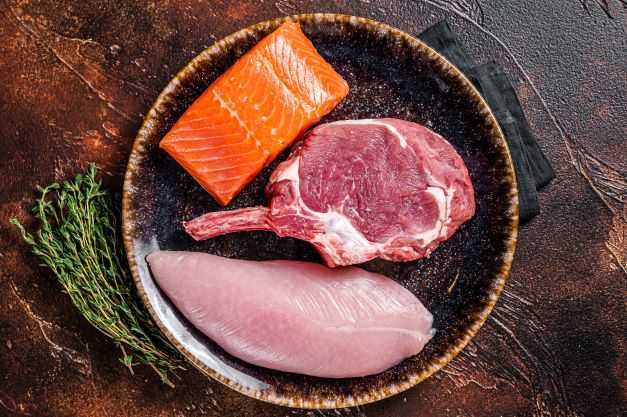- Vitamin B12 is an essential nutrient needed for the making of red blood cells, the production of DNA and the healthy functioning of the nervous system
- Vitamin B12 is found almost exclusively in animal-based foods including meats, poultry, seafood, milk, cheese and eggs
- Vitamin B12 deficiency is a potential concern for someone following a vegan or vegetarian diet
- If you follow a vegan or vegetarian diet, eating foods fortified with vitamin B12 or taking a supplement can be good ways to help reduce the risk of diet-related deficiency
3 minute read
Vitamin B12 (also called cobalamin) is an important vitamin. We need this vitamin to make red blood cells and new DNA for growing and dividing cells. Vitamin B12 also helps maintain the health of the conductive coating that surrounds and protects nerves.
Vitamin B12 deficiency
Vitamin B12 deficiency can be slow to develop. This means symptoms can appear gradually and intensify over time. Initial signs that someone could be deficient in vitamin B12 include the following:
- pale skin
- confusion and memory problems
- fatigue
- headaches
- mood changes
- difficulty concentrating
Many of the symptoms of vitamin B12 deficiency can be explained by its important role in making red blood cells. Deficiency of vitamin B12 impairs the production of healthy red blood cells, giving rise to anaemia. The anaemia occurs due to a slowing of DNA synthesis resulting in the inability of red blood cells to divide. This type of anaemia is also called megaloblastic anaemia because the red blood cells appear large and immature under a microscope.
Vitamin B12 deficiency has two main causes. Either from impaired absorption through the small intestine or from eating a diet that is low in this nutrient.
Inadequate absorption of vitamin B12 can occur due to a lack of hydrochloric acid in the stomach or a lack of a special protein needed to bind to vitamin B12. This protein is called intrinsic factor. With less stomach acid, the vitamin is not released from food and is not available for binding to intrinsic factor. Without intrinsic factor, the vitamin cannot be absorbed.
Many people over the age of 50 develop a chronic inflammatory condition of the stomach called atrophic gastritis. This affects the cells lining the stomach. Without healthy stomach cells, the production of hydrochloric acid and intrinsic factor diminishes. This can put a person with atrophic gastritis at risk of vitamin B12 deficiency.
Surgery of the gastrointestinal tract, such as weight loss surgery or surgery to remove all or part of the stomach, can result in a loss of cells that produce hydrochloric acid and intrinsic factor. This reduces the amount of vitamin B12 absorbed.
The second main cause of vitamin B12 deficiency is from not having enough in the diet. A diet lacking in vitamin B12 is common in people who follow a vegan or vegetarian diet unless it includes foods fortified foods like some plant-based milk. That’s because natural food sources of vitamin B12 are mostly limited to animal foods.
Depending on the cause, vitamin B12 deficiency may be treated with dietary changes, vitamin B12 injections or oral supplements.
Food sources of vitamin B12

Vitamin B12 is unique among the vitamins because it is found almost exclusively in foods derived from animals. That includes fish, meat, poultry, eggs, milk, and milk products. Bioavailable vitamin B12 is rarely present in plant foods.
Anyone who eats reasonable amounts of animal-based food can be confident of an adequate intake of vitamin B12. People who are vegetarians and consume milk products or eggs also have a good level of protection from deficiency.
People who follow a vegan diet need a reliable source of vitamin B12. With few exceptions, vitamin B12 found naturally in plant foods is likely to be in an inactive form.
For someone following a vegan diet, consuming fortified foods or taking a vitamin B12 supplement are the only viable ways to obtain enough of this nutrient. Food Standards Australia New Zealand permits only a limited number of foods to be fortified with vitamin B12. This includes selected soy milks, yeast spread, and vegetarian meat analogues such as soy-based burgers and sausages.
Spirulina, which is a type of blue-green algae, is sometimes promoted as a good source of vitamin B12. But it is present in an inactive form that the body cannot make use of and could even interfere with the absorption of other sources of vitamin B12.
Popular fermented foods such as tempeh, kimchi, sauerkraut and kombucha only contain trace amounts of vitamin B12.
Mushrooms do contain a small amount of active vitamin B12. But the amount of mushrooms needed to supply adequate amounts of B12 is impractical to make these a useful food source.
If you are pregnant or breastfeeding and follow a vegan or vegetarian diet, you should make sure you get enough vitamin B12 to provide for your developing baby. If a breastfeeding mother is deficient in vitamin B12, her infant may also become deficient.

Plant-based diets which can be low in vitamin B12 need to be well planned to meet your nutritional needs. An Accredited Practising Dietitian (APD) can help you meet your individual needs.
We recommend seeing a dietitian if you:
- have been diagnosed with vitamin B12 deficiency and want some support on the dietary management of this condition
- need nutritional advice to help ensure you're meeting your individual nutrient requirements
- if you have specific nutritional needs, such as during pregnancy or for children
- would like advice on whether you need to add a vitamin B12 supplement to your diet
Accredited Practising Dietitians (APDs) are university-trained nutrition experts. They can help you with personalised, easy-to-follow and evidence-based advice.
APDs are Australia's most trusted dietetics professionals.
- If using a plant-based milk like soy or almond milk, choose one that is fortified with vitamin B12
- If you follow a vegan diet, it may be good to speak to your doctor about getting your vitamin B12 blood levels checked regularly